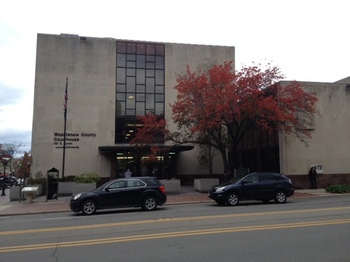The Washtenaw County Trial Court is looking to implement a $2 million upgrade this year to its outdated electronic filing system that's on its last leg.
As the vendor for current filing system, Enact, is out of business and the county’s IT staff member that knew how to repair it had to leave his position, there’s no safety net in place should the system crash.

The Washtenaw County 22nd Circuit Court at the corner of Huron and Main Street in downtown Ann Arbor. It's one of two courts in the county's Trial Court.
AnnArbor.com file photo
“We’re really in a tenuous position,” said Dan Dwyer, court administrator. “There’s no vendor to fix it and there’s no in-house person to fix it anymore. ... If the system goes down, I might as well lock the front door."
The overhaul of the court’s record system to an all-electronic, online portal would be the single biggest change to the county's court system in decades, Dwyer said.
“This would advance us light years,” Dwyer said.
The Trial Court is a merger of the 22nd Circuit Court and Probate Court.
Dwyer said the court has identified a new vendor - Tyler Technologies - for the system and estimated that the upgrade would cost about $2 million.
Court systems in Kalamazoo and Wayne County operate using the Tyler system now.
The court’s $18.6 million budget does not have room to foot the entire bill for the new electronic filing system - and so the Trial Court will have to work with the county administration to find a funding source, Dwyer said. The Trial Court has been saving some of its funds to put toward the new record system, he said.
The Tyler system would allow people to submit their documents electronically for a standard $5 charge instead of mailing them or hand-delivering them to the courthouse. Judges will be able to electronically sign documents through the new system.
Dwyer said he’s anticipating a huge reduction in paper use for the Trial Court with the new system.
Court payments also will be simpler. Dwyer said the Tyler system calculates and tracks late fees automatically -- a role that would have taken the time of two employees. The Trial Court has not been collecting late fees because it doesn't have the staff to allocate to tracking them, Dwyer said.
Dwyer said he anticipates more revenue from late fees because people will now be more encouraged to pay on time.
Under the Trial Court's filing system now, users have to physically come in to the courthouse to review motions filed and case actions. Case files in paper format must be physically reviewed in private kiosks.
The system upgrade would mean that case files from the implementation date forward would be available only in electronic format on the county's servers.
Users would be able to access court motions and a register of case actions remotely through an online portal. However, people would have to travel to the courthouse to review full case files on county computers -- a measure that Dwyer calls "practical obscurity."
"Really, do you want someone to be able to look up your divorce when they're mad at you?" Dwyer said. "If they have to come down to the courthouse to do it, they're not going to."
Old case files will not be put into the new electronic system because it's not cost-effective, Dwyer said.
Dwyer said the Trial Court has been in the process of seeking a new vendor for the past several years, and has worked with the county's IT department to select Tyler Technologies.
The Trial Court was previously a part of a pilot project initiated by the Michigan Supreme Court that was developing a new electronic court records system of its own. Washtenaw County contributed $550,000 to the effort and three years of an employee's time, who has an $80,000 salary, Dwyer said.
The pilot project was supposed to be completed in a year and a half. After five years of no results, Dwyer said the county dropped out of the project and was reimbursed for its $550,000 contribution.
Dwyer said the Trial Court is in the process of negotiating final costs and a contract with Tyler Technologies.
The contract will have go before the Board of Commissioners for approval.
The Trial Court had been waiting to submit the proposal to the Board of Commissioners until after it voted on a potential bond issue for its retiree health care and pension debts -- which had been originally slated for July 10 but is now on hold.
Dwyer anticipated the item could be on the board's August agenda.
The request for the electronic record system upgrade won't be affected by a July 10 vote by commissioners to postpone terminating the Memorandum of Understanding between the county administration and the Trial Court to October. The move was made to give administration more time to work with court staff on the issue.
Commissioner Alicia Ping, R-Saline, introduced the measure in June as a way to seek more control over the Trial Court's lump sum budget agreement.
The Trial Court submits a line-item budget to the county each year for approval, Dwyer said. Should the MOU be terminated -- which sets the ground rules for how the court interacts with the county -- Dwyer said it would give the county board no additional control over court operations.
“Everything we do now, we do collaboratively,” Dwyer said of the Trial Court and the county administration.
Amy Biolchini covers Washtenaw County, health and environmental issues for AnnArbor.com. Reach her at (734) 623-2552, amybiolchini@annarbor.com or on Twitter.